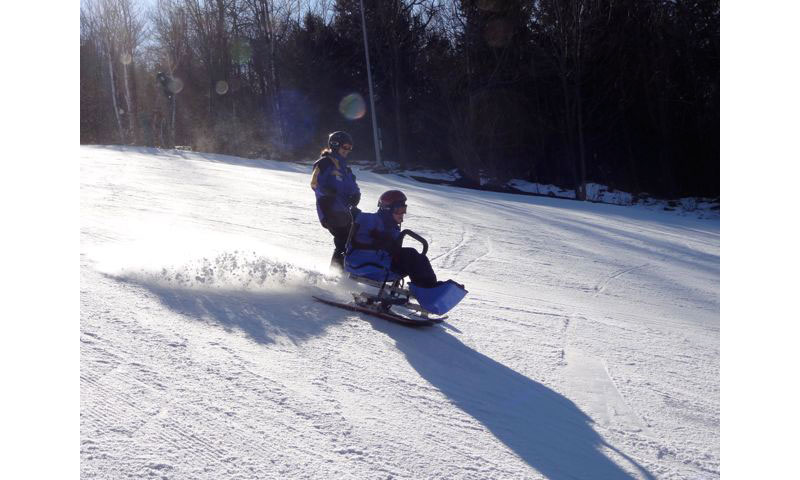Study Poised to Help People who Use AAC
By David J. Hajjar, M.S., CCC-SLP, Ohio University
Individuals with acquired neurogenic disabilities and have complex communication needs can experience many challenges with community reengagement. After experiencing inpatient services focusing on restoration and improvement, transitioning to community-based services may seem inadequate. Some therapy services may drop off and individuals may become isolated due to diminished social networks. Adaptive sport and recreation professionals and programs support active lifestyles and the development of meaningful relationships between people with disabilities and people without disabilities. Also, there are many opportunities for communication and rich social exchange. These community based programs promote full participation in real world contexts.

Even though the specific activities may vary (e.g. skiing, snowboarding, horseback riding, cycling or rock-climbing) success depends not only on the characteristics of the person but on the knowledge and skills of professionals and volunteers. These individuals become natural communication partners as a result of the shared activity. Across the active recreation experience, communication and social relationships thrive. Teams work together in order to be successful and maximize the experience for all stakeholders.
Your Feedback on Your Sports and Recreation Experiences are Needed
 People with acquired complex communication needs (ACCN) may experience barriers to participation and it is worthwhile to determine how these individuals remove obstacles and communicate with facilitators across active recreation experiences. It is important to gather the perspectives of these individuals who participate in adaptive sport and recreation. Through a focus group forum, researchers at Ohio University will facilitate an online discussion with people with ACCN. Participants in the study will have an opportunity to discuss what they do for active recreation, why they participate and how they make it happen. The goal of the research is to understand more about the active recreation experience from the perspective of a person who is participating (e.g. rider, skier, climber, hiker).
People with acquired complex communication needs (ACCN) may experience barriers to participation and it is worthwhile to determine how these individuals remove obstacles and communicate with facilitators across active recreation experiences. It is important to gather the perspectives of these individuals who participate in adaptive sport and recreation. Through a focus group forum, researchers at Ohio University will facilitate an online discussion with people with ACCN. Participants in the study will have an opportunity to discuss what they do for active recreation, why they participate and how they make it happen. The goal of the research is to understand more about the active recreation experience from the perspective of a person who is participating (e.g. rider, skier, climber, hiker).
Finding out what adaptive sport and recreation offers may also provide stakeholders with important insight about developing and improving psychosocial skills for people with ACCN. Intrinsic skills such as motivation, confidence and resiliency are important for participation and in achieving communicative competence. These skills can contribute to a person's ability to engage and maintain relationships. This research will investigate how active recreation supports psychosocial skills and how individuals use these skills across other aspects of their lives.
The online focus group will commence in August of 2015. Recruitment is currently underway and if you fit the following criteria, please consider participating.
- 18 years or older
- Have a diagnosis of an acquired neurogenic disorder which severely impacts communication and your ability to be understood by unfamiliar listeners
- Currently have a complex communication need and may require the use of augmentative and alternative communication (AAC)
- If AAC is used, it may be either high or low tech
- Able to read and write independently
- Must have an email address and consistent and reliable Internet connectivity
- Repeated participation in adaptive sport and recreation over the past twelve months (Some examples of active adaptive sport and recreation activities would include: skiing, snowboarding, horseback riding, rock climbing, paddling, waterskiing, scuba diving, cycling, surfing, rowing)
Your story would contribute a great deal to enhancing the experience for people who use AAC and assisting facilitators and other related professionals who provide support. If you have additional questions or think you may be interested in participating, please email David Hajjar at [email protected].
About the Author:
David J. Hajjar, M.S., CCC-SLP is currently pursuing his doctorate in communication sciences and disorders with a specialization in augmentative and alternative communication at Ohio University. Prior to coming to Ohio University, he worked as a licensed speech-language pathologist for 15 years in New Hampshire and Massachusetts. His most recent research project focuses on the role of community partners and volunteers as they support individuals who have complex communication needs (CCN) across recreational and community based settings.
Pre-Register for Abilities Expo Today...It's Free!